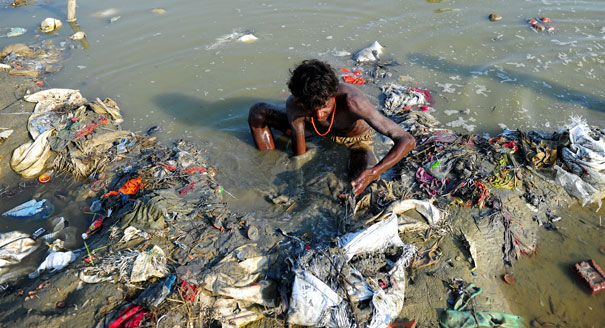Registration
You will receive an email confirming your registration.
IMGXYZ4354IMGZYXIn the last four decades, over eighty legal frameworks have been established for international cooperation on sustainable development. However, these frameworks are not adjusting quickly enough to the problems of rapid development in new emerging powers, development that often has repercussions for climate change and environmental pollution.
Carnegie-Tsinghua’s Wang Tao hosted a panel discussion featuring Mark Halle, vice president of the International Institute for Sustainable Development (IISD); Zhang Haibin, professor at Peking University; and Zhou Dadi, former director general of Energy Research Institute at the National Development and Reform Commission. The discussants addressed the challenges and future of the global governance of sustainable development.
Development and Shifts of the Sustainable Development
The past four decades have witnessed remarkable progress in the global governance of sustainability, but structural issues now stall the system, panelists agreed.
- Development of the Regime: Discussants said that states have built an impressive global governance regime, enshrined in multilateral agreements and buttressed by a diverse network of institutions, NGOs, and forums. Halle explained that transparency, participation, and the robustness of the regime have improved vastly as actors uniformly strive to codify binding commitments.
- Structural Problems: Halle added, however, that given modern challenges, the structure of the international system no longer facilitates effective outcomes. The system still relies on state governments making all the important decisions, while private and civil sectors are not fully accounted for. Good governance, accountability, and trust are lagging. Major powers and blocs are dissolving and creating new configurations, Halle said, and meanwhile there is no new authority competent enough to provide governance of sustainable development.
- Rising Number of Stakeholders: Halle pointed out that the number and role of stakeholders has grown dramatically since the sustainability movement began. A revised framework must capitalize on the respective capabilities of these governmental actors, corporations, and NGOs, and work to resolve differences between them. Zhang responded that the various interests and roles of the different stakeholders should be incorporated into any future international governance system.
Future of Sustainable Development
While there remains tremendous potential for these international legal frameworks, the way forward is unclear.
- Revisions to the Roadmap: Halle stated that the global regime and national governments need to advance sustainable measures, such as reforming subsidies for polluting industries, revising tax codes, and advancing incentives for strong environmental performance. He added that unconventional alliances are forming due to the growth of NGOs’ analytical capacity and reporting power. Overall, Halle described the future of sustainability as a series of waves: initiatives build and swell and, though sometimes only briefly, continue to push the movement forward.
- Role of Sub-National Jurisdictions: Halle noted that sub-national actors such as “mega-cities” can play a key role in advancing sustainability. While progressive federal legislation often remains difficult to attain, jurisdictions like California and Beijing have advanced environmental initiatives on their own. Halle indicated that these actions could build momentum and oblige countries to respond holistically.
Role of Developing Countries
A number of problems and prospects in global governance systems arise from the expectations for, and role of, developing countries.
- Dynamic Development: Halle stated that China and India have emerged as two of the world’s largest carbon emitters and each claims significant sustainability concerns. However, they remain developing countries and are still seeking to clarify a domestic balance between economic development and environmental protection. Another discussant added that China is also being looked to as a potential (co)leader of global governance of sustainable development.
- Economic Concerns Trump Environmental: Economic matters are still often prioritized over environmental, discussants agreed. Zhou stressed that China has not yet reached the standard of living common to developed nations, and that this poses problems when international actors call on China and other developing nations to commit to various reductions in environmental externalities. Zhang noted that Chinese hesitancy to monitor environmental pollution illustrates that the central government still prioritizes developing the economy, even if development translates into a failure to reach environmental targets. But the recent outcry and increasing public pressure on rising levels of pollution have begun to alter Beijing’s view, he concluded.
Discussants: Zhang Haibin, Zhou Dadi
